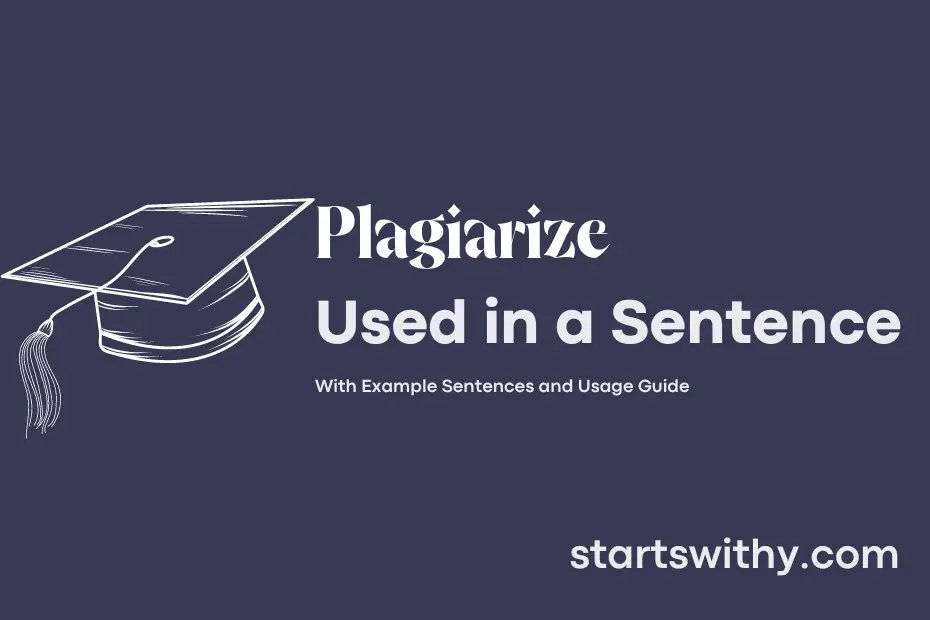Have you ever heard of plagiarism? Plagiarism is when someone uses someone else’s words or ideas without giving them proper credit. It is a serious offense in the academic and professional world, as it involves dishonesty and lack of originality.
7 Examples Of Plagiarize Used In a Sentence For Kids
- I will not copy and steal other people’s work.
- Copying someone else’s ideas is dishonest.
- Always remember to use your own words.
- It’s important to be original in your work.
- Plagiarizing is not a good thing to do.
- Ask for help if you don’t know how to do something.
- Be proud of your own thoughts and creations.
14 Sentences with Plagiarize Examples
- Students should never plagiarize their assignments as it can lead to serious consequences such as failing the course.
- It is important to properly cite sources to avoid unintentional plagiarism in academic papers.
- Some students may plagiarize out of desperation, but it is always better to seek help from professors or tutors.
- Many universities have strict policies against plagiarism and students found guilty may face suspension or expulsion.
- When writing research papers, it is crucial to paraphrase information from sources rather than directly plagiarizing.
- Using quotation marks and citing the author is essential when including direct quotes to prevent accusations of plagiarism.
- Seeking guidance from professors on how to properly cite sources can help students avoid unintentional plagiarism.
- There are various online tools available to check for plagiarism in students’ work before submission.
- Some students may feel overwhelmed with assignments and resort to plagiarizing without realizing the severity of the consequences.
- Proper time management and planning can reduce the temptation to plagiarize due to last-minute pressures.
- Understanding the difference between summarizing, paraphrasing, and plagiarizing is crucial for academic success.
- Peer pressure or competition among students can sometimes lead to plagiarism as individuals strive to excel in their academics.
- Students should attend workshops or seminars on academic integrity to learn about the consequences of plagiarizing.
- Academic dishonesty, such as plagiarism, not only affects the individual student but also undermines the credibility of the institution.
How To Use Plagiarize in Sentences?
Plagiarize means to use someone else’s work or ideas and pass them off as your own without giving proper credit. It is important to always avoid plagiarizing in academic, professional, and creative settings as it is considered unethical and can have serious consequences.
Here is a guide on how to use plagiarize in a sentence:
-
Select the content you want to use from a source, such as a book, article, or website.
-
Plagiarize the writer’s words without attribution by copying and pasting them into your own work.
-
Make sure the copied content blends seamlessly with your writing style to avoid detection.
-
Remember to change the wording slightly to make it appear as if it is your original work.
-
Finish your sentence by crediting the original author or source from which you plagiarized the information.
Example sentence: “In his essay, John plagiarized several paragraphs from an online article without acknowledging the source.”
Remember, it is best to always provide proper citations and references when using someone else’s work to avoid plagiarism. When in doubt, it is always a good idea to paraphrase or summarize the information in your own words and give credit to the original source.
Conclusion
In conclusion, it is imperative to understand that plagiarizing sentences by using someone else’s work without proper attribution is unethical and can have serious consequences. Copying sentences directly from sources without acknowledgment not only violates academic and professional integrity but also undermines the original creator’s efforts and rights.
To avoid plagiarism, always cite your sources and provide proper references when using information or ideas from other sources. By paraphrasing, summarizing, and citing the original authors, you can create unique and authentic content while respecting intellectual property rights. Ultimately, promoting a culture of honesty and integrity in writing is essential to upholding academic and professional standards.



